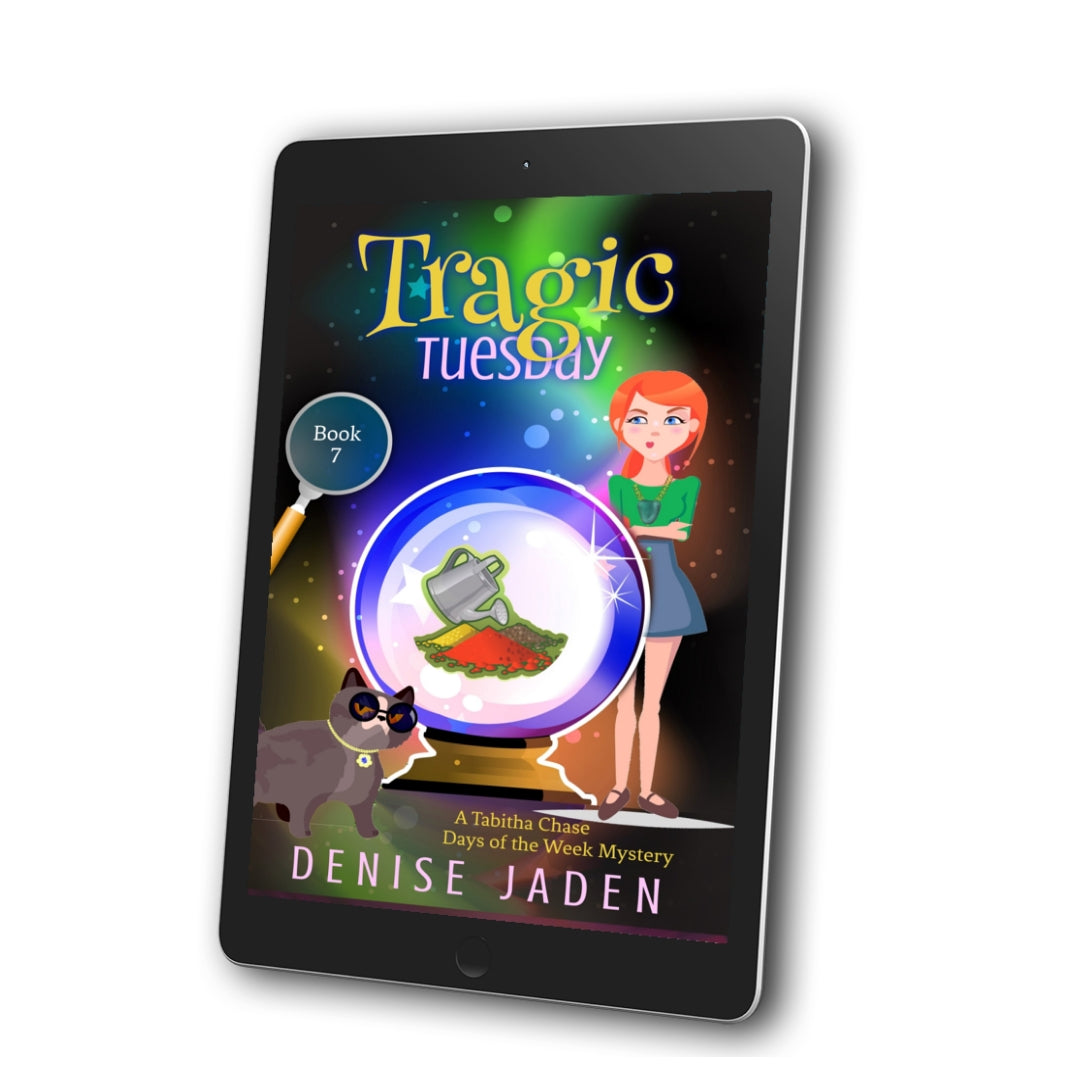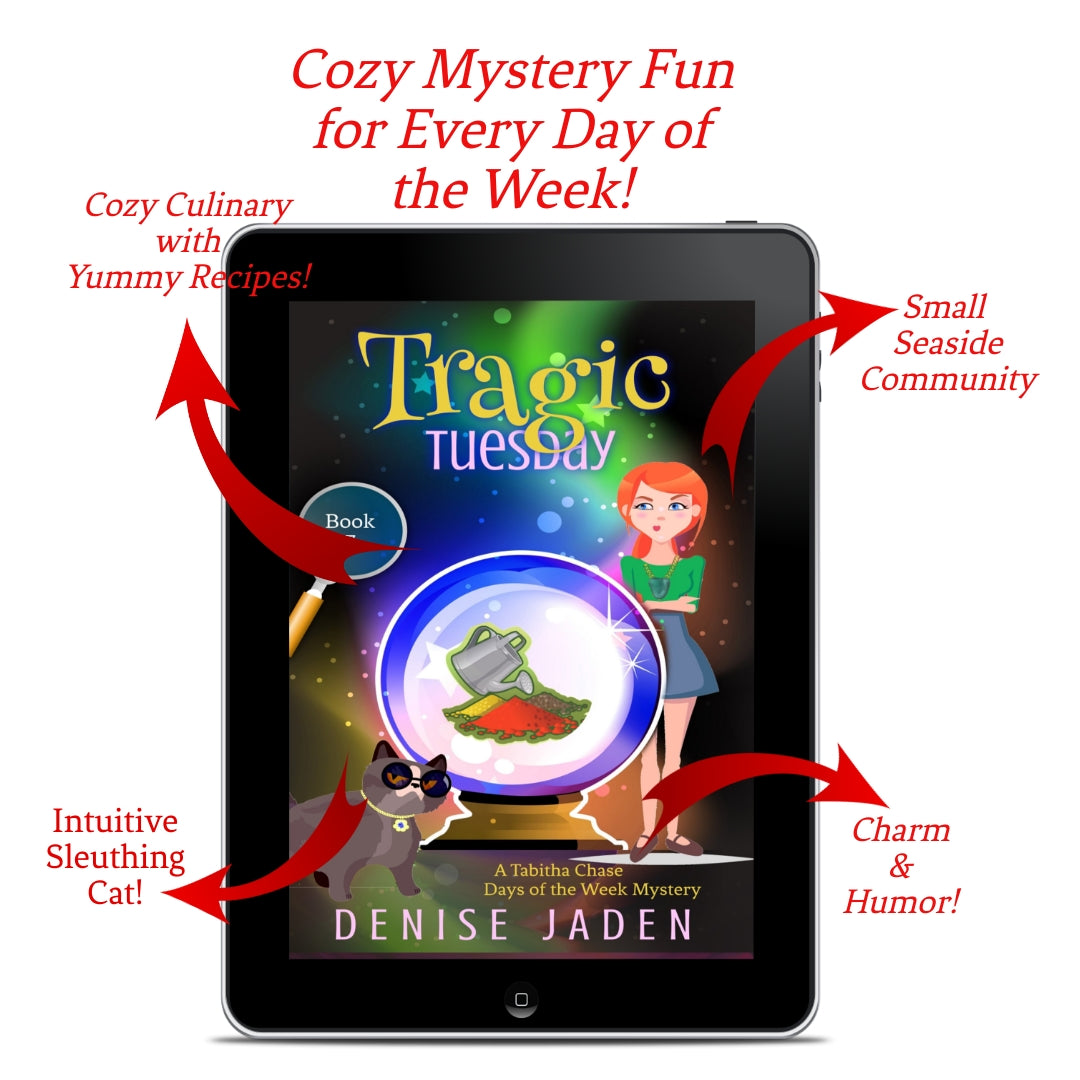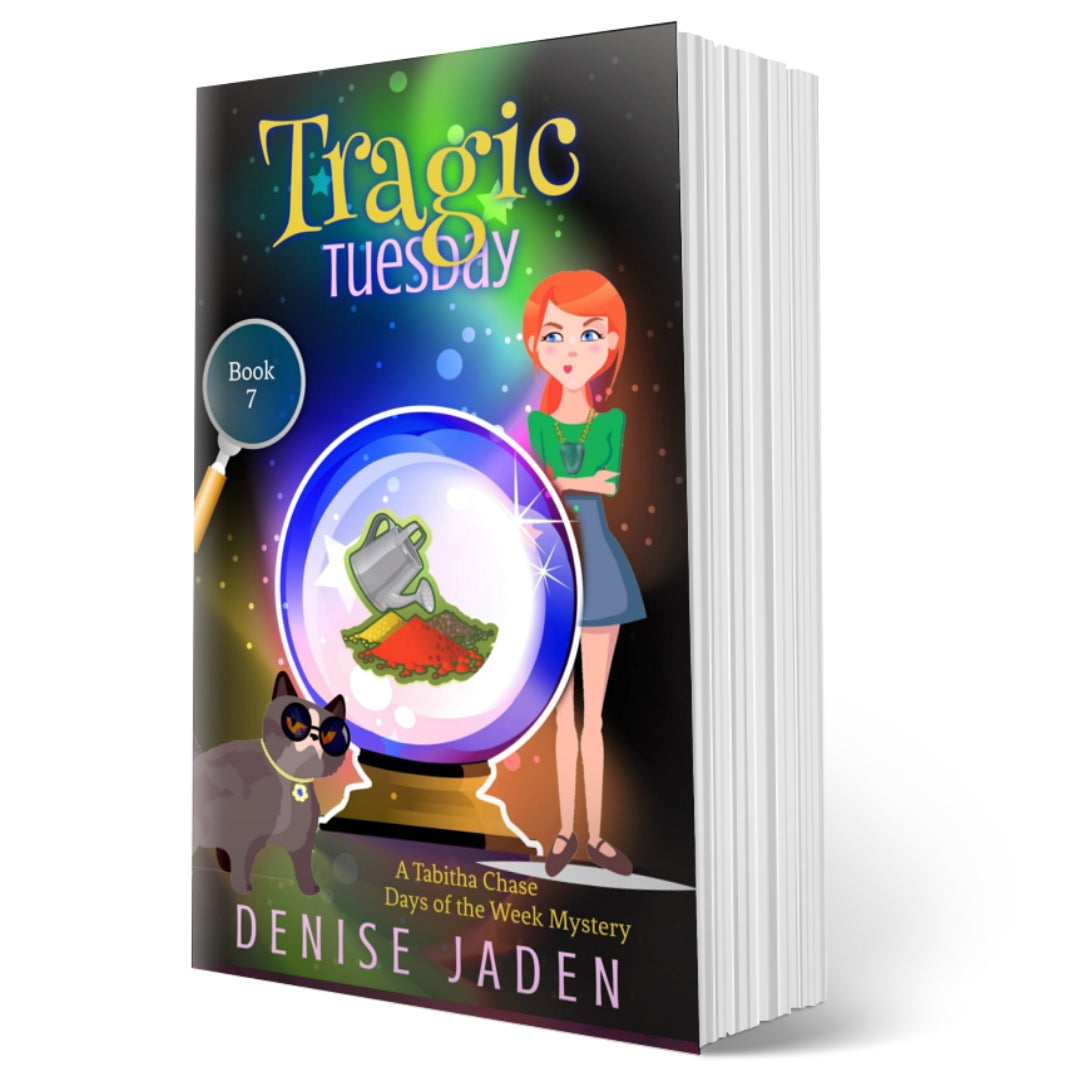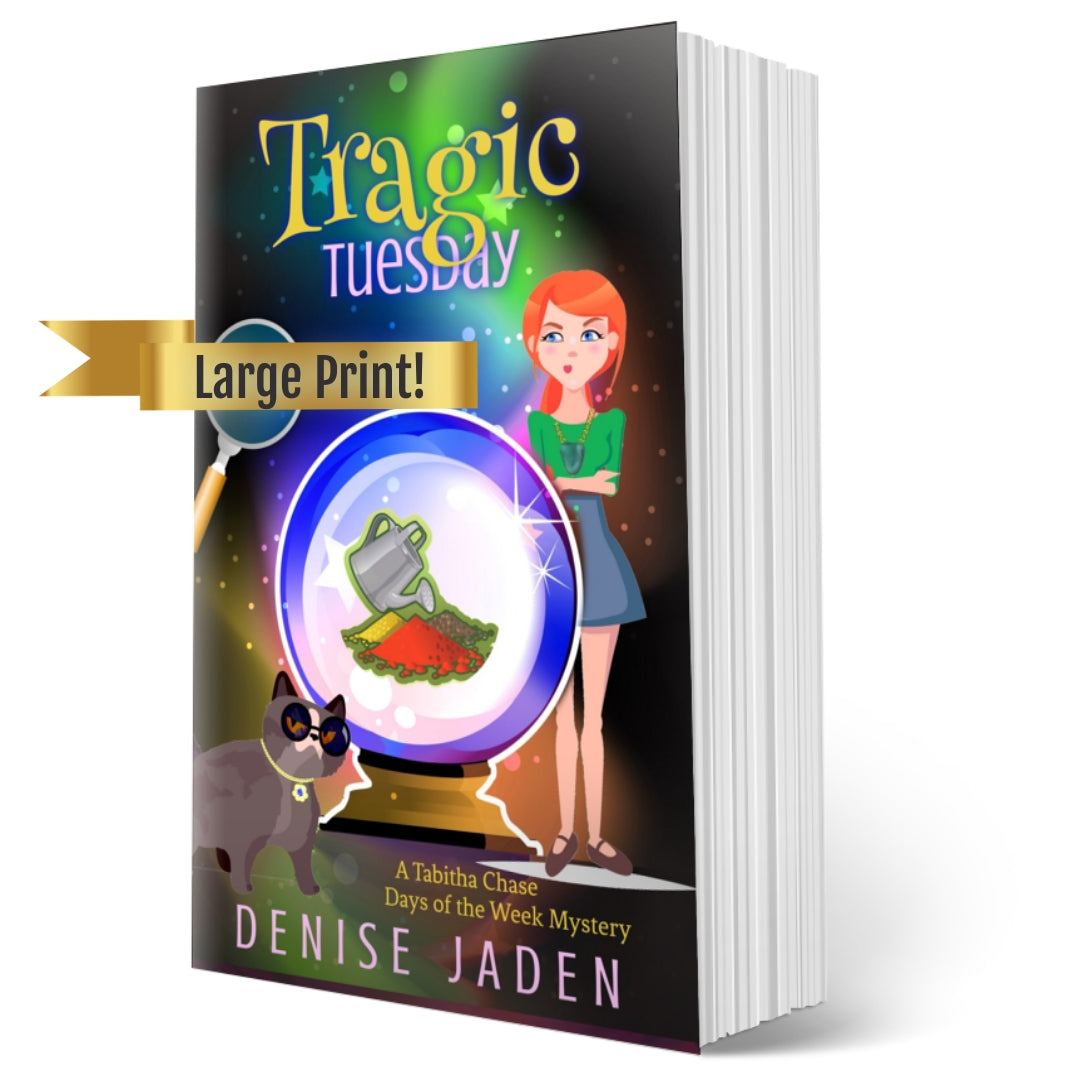Book 7 - Tragic Tuesday (A Tabitha Chase Days of the Week Mystery) - E-book ⭐⭐⭐⭐⭐ 4.75 stars
Book 7 - Tragic Tuesday (A Tabitha Chase Days of the Week Mystery) - E-book ⭐⭐⭐⭐⭐ 4.75 stars
Couldn't load pickup availability
- Purchase the E-book Instantly
- Receive Download Link via Email
- Send to Preferred E-Reader and Enjoy!
Join Tabby, Jay, Aaron, and Sherlock as they investigate and try to get to the bottom of this garden tragedy. Download your copy of the seventh standalone mystery in the Tabitha Chase Days of the Week Mysteries now!
What to expect:
✔️ Quaint seaside town!
✔️ Magic and mystery!
✔️ A talking cat!
✔️ A psychic detective!
Find it in paperback or large print at https://books2read.com/tragictuesday
Main Tropes
- A seaside town
- A smart and savvy amateur sleuth
- A spectacled cat named Sherlock
Synopsis
Synopsis
It’s springtime, and Tabby figures what better way to unite the town of Crystal Cove than by creating a community garden! Unfortunately, she knows nothing about tending the earth. However, there are several folks in town who have strong beliefs in how to start a garden right—but all of these folks disagree with one another.
Tabby thinks she has it handled when she comes up with a system that makes each group of gardeners feel valued in their plans and opinions, but when one of the most opinionated women turns up dead in the middle of the fresh soil, it seems Tabby has another murder on her hands—and one she feels at least partially responsible for.
Join Tabby, Jay, Aaron, and Sherlock as they investigate and try to get to the bottom of this garden tragedy.
Intro Into Chapter One
Intro Into Chapter One
Chapter One
Most people might hesitate to bring their cat to a brand-new community garden for fear of him treating it like his own personal litter box. Me? My fear was about my nearsighted cat Sherlock digging up a dead body.
It wouldn’t be the first time he had launched me and my detective friends head-first into an investigation. The way he paced around the outer edges of what I hoped would become a community haven full of peace and goodwill, unfortunately, made my inner detective sense prickle.
Last month, I’d organized a Crystal Cove community potluck, but it hadn’t been well attended. It seemed once the witch coven in town heard that the church folk were invited, they decided not to attend. And then the church folk didn’t end up coming either.
Next, I’d tried organizing a Heritage Celebration, figuring the locals would all want to celebrate their unique home town. While several local shop owners appeared to be on board with this, at closer inspection, it seemed they had all raised their prices of sales items in hopes of making a good profit from tourists. I hadn’t advertised the celebration beyond our township, as it was intended as a community-building event, so that had fallen flat, too, and no one left the celebration in any better spirits.
My late Aunt Lizzie had a passion for bringing this town together, and had been a real joining force between the local witches and the rest of the community. Since her death, the divide between the different groups in town just kept growing, but I felt compelled to honor Aunt Lizzie’s wishes and find a way to bring them back together.
A community garden was my last go at this. It had sounded like such a quaint idea when I’d first come up with it. The community coming together and growing something together, rather than spending all of their energy bickering or avoiding one another. My plan was to have shared maintenance, so everyone in town could learn to care for each other’s harvest, and a portion of everything we grew could be donated to the local food bank. It was all about the word community.
But already it seemed to be having the opposite effect.
“I’ve been saving and drying these seeds all year!” Barbara Colling, one of the most outspoken witches in town waved her hands toward a flat tray which looked to have a hundred very organized compartments atop it. “They’re organic and have never come into contact with any of those awful chemicals.” She sneered toward the church couples, who were busily unloading a variety of different fertilizers from the back of one of their car trunks.
They paused at Barbara’s words. Edith, who was in her late sixties and had taken on a supervisory role, responded to Barbara. “Don’t you think it might be too late in the year to start from seeds, Barbara?” Without leaving her time to answer, she added, “And do you want to take the chance of wasting all this great land by not giving our plantings the best possible chance?”
I could tell Edith was making a concerted effort not to offend Barbara. Unfortunately, it was working the other way around.
“Not if the best chance means ending up with a garden full of vegetables I won’t want to eat!” Barbara moved closer and crossed her arms. She was a little younger and stockier than Edith and looked as though she was ready to bully the woman into submission.
I looked back and forth between the two women and then stepped up between them before things could get any more heated. “What if we keep a section specifically for organic seeds, and in the rest of the garden we can grow from seedlings,” I suggested to Edith.
Barbara flapped her hands upward. “I don’t want their chemicals catching the wind and landing all over my seeds!” She was wearing a bright orange dress which fell to the ground, not unusual for the witches in town, but a little unusual for gardening. She also wore a wide-brim black hat that she flicked up every time she spoke, as though wanting anyone nearby to see the full scope of the anger in her eyes. At least she’d brought gardening gloves which was more than I could say for myself.
Because I didn’t have a lot of faith in my ability to argue with Barbara while she was so heated, I pulled Edith aside. “You know gardening a lot better than I do. Can you help me find a way to compromise here?”
“If she’s so worried about her precious seeds, maybe she should plant them somewhere else.” Edith’s resentment for the witches wasn’t only about planting the garden. Last fall, there had been a lot of tension between the church’s harvest festival and the witches’ haunted house, and which one should be given the town’s support.
I sighed inwardly and tried again. “Listen, planting this garden is supposed to help bring the community together. It’s what Crystal Cove needs. Can’t you help me figure out something?”
Edith met my eyes and she stared at me for several long seconds. I hoped my face was conveying my concern for the town, because I wasn’t ready to admit defeat, not when Aunt Lizzie’s dream was at stake.
Finally, she took in a big breath and surveyed the open space around us. Most of the local witches were single, but Barbara was one of the few who had a husband. He was a quiet German man named Heinrich, who had appeared on the scene and looked like he was doing his own work on trying to calm his wife down. She acted like a busybody, motioning to different parts of the garden, pulling out a ball cap and putting it on her husband’s head and pointing an angry finger up toward the bright sun. It seemed like one thing after another was going to provoke her, despite the way her husband kept trying to wrap an arm around her and calm her down. If it wasn’t the chemical fertilizers, it was her husband’s neglect when it came to sun protection. I felt a sudden kinship with Heinrich, like we were two coaches in a boxing ring.
In this one case, I hoped he was the better coach, because his fighter needed the right words more than Edith did. Sherlock was over by the group of five witches that had shown up to garden today, but he still seemed more interested in pacing the perimeter of the garden than actually getting involved. I found myself getting a little jealous of my cat for being able to stay out of it.
Next, he passed by Marigold Weathers, a witch in her sixties who’d recently had a falling out with most of the other witches in town. It appeared she knew what she was doing in the garden, with a whole bin full of tools at her side and a small hoe in her hands. She was working on her own small patch of land, apparently not combining her efforts with the witches nor the rest of the townsfolk who had come out to help this morning.
“I have an idea,” Edith said, breaking my attention from the witches. “If you can stop the Schwartz family from tilling the soil where they’re at and move over to the back section of land, then Barbara could plant her seeds near the front where they might get enough sun to grow a decent harvest. We’ll start our seedlings here.” With the back of her low boot, she drew a line in the dirt. “We can leave a walkway in between, and we can check meteorologist reports and only fertilize when the wind is coming from the northwest. How does that sound?”
It seemed like Edith was truly trying to help, but unfortunately, it sounded like more divisiveness. I sighed again, wondering how it would sound to Barbara, who, by the way she was flapping her arms up and down, still seemed agitated.
“Let’s go talk to the Schwartz family and their employees first,” I suggested.
The Schwartz family was well known in Crystal Cove. They owned the biggest mansion in town, right on the ocean, a mile down the highway. All four of them frequented The Heirloom Café where I worked, always with a very specific order and always in a hurry to take it to go. The twentysomething daughter, Annabelle, was especially fussy, wanting an exact measurement of soy milk in her latte and brewed to a perfect 140 degrees.
Annabelle now stood back from the garden, studying her clean fingernails as the servants her family had brought along prepared the land for planting.
When I’d first arrived this morning, Annabelle and her parents were already here, talking over their plans for the garden. Even though it was supposed to be a community event, and I was certain they could easily purchase their own plot of land for a private garden if they wanted to, when they first broke land and started tilling the soil, I hadn’t stopped them. They were the type of customers at the café that wouldn’t argue. They would simply take their business elsewhere. And I did want them to be a part of this garden, even if they needed to feel as though they had their own little section. Now it felt like too late to argue, but at the same time, I hoped they would be easier to negotiate with than Barbara.
“Mr. and Mrs. Schwartz?” I asked, as I approached them.
They both turned from where they had been directing their three staff members—two men and a woman. I wasn’t certain what Mr. Schwartz did for a living to make his fortune, but he looked like a businessman, in his navy suit, and the way he looked over his glasses at me.
“Yes?” He answered for both of them.
“Before you get too far into the tilling of this section of land, I wanted to discuss perhaps shifting you to a different area of the garden. You see, one of our gardeners is growing from seeds, and—”
That was all I got out before Annabelle looked up from her nails and stomped toward us. “She’s not making us move, right, Daddy?” Annabelle, who was tall and lean, wore white yoga pants and a permanent scowl—the same one she usually wore into the café. “She can’t! We’re not having our guests trek through a bunch of vegetables to get to the gazebo!”
There was a lot to unpack in her argument. “Gazebo? Guests? What, exactly, are you aiming to have happen here?” I motioned an arm to the open area of town land that had been graciously offered up for my community garden project, thanks to my friend Aaron Thom, the newly elected mayor of Crystal Cove.
Mrs. Schwartz stood an inch taller than her nearly six feet as she answered me. “I was under the impression this garden was for all of us. Ever since you announced its creation, our Annabelle has had her heart set on getting married here. It’s a beautiful location for a wedding, don’t you think?”
While I couldn’t argue that it would indeed be a beautiful location for a wedding with its mountainous backdrop and far enough away from the highway to feel isolated, it seemed presumptuous to me that they wouldn’t even discuss this with anyone before simply going ahead and planning this wedding.
Mrs. Schwartz went on without leaving time for me to argue or even give an opinion. “We’re having the gazebo delivered and setup on Monday, so today is the day to get the soil tilled all around it, the foundation built, and the area mapped out for it to get constructed.”
“But Mrs. Schwartz, this garden is for everyone. We have to share, and this is quite a large area for your family to claim as their own.” I was so used to acting compliant with them at the café, my argument came out weaker than I’d hoped. But thankfully, Edith had followed me over, and she took over.
“We won’t want to use up any of this good sunlit soil with a gazebo. If you want to construct one of those, I’d suggest putting it out by the parking lot.” She pointed to the gravel lot where several men from the church were still unloading fertilizers from their cars.
“You want me to get married in a parking lot?” Annabelle looked horrified. “Daddy, do something!”
Mr. Schwartz reached into his jacket pocket and pulled out a checkbook. “Alright. What’s this going to take to make this problem go away?”
I shook my head. “It’s not about the money, Mr. Schwartz. It’s about the seeds and the sun they need, and this is the sunniest space in the garden so—”
“I know!” Annabelle said. “That’s why I chose it.”
I motioned to the flats of what looked more like full-fledged plants than seedlings that they had brought along. “Your plants will have a great chance of surviving in any section of the garden, and we have to share. The seeds need the sunshine. They need to be planted here.”
Unfortunately, I’d been so busy arguing, I hadn’t noticed Barbara and her entourage of witches making their way over.
“Thank you, Tabby. So this is where we are going to plant?” Barbara didn’t wait for an answer and marched forward to the freshly-tilled soil. “We’ll take it from here,” she said to the three staff members who had been working all morning.
“Daddy!” Annabelle practically shrieked.
Mr. Schwartz turned toward me. “I see you drive a hard bargain. How does ten thousand dollars sound?”
It sounded great, but not if the outcome was going to be more division in our town. Ten thousand dollars wouldn’t buy us a new plot of land, and there wasn’t a lot of flat undeveloped land around Crystal Cove, so it wasn’t as though we could go somewhere else.
“This garden is not for sale,” I explained. “It’s for the whole town. Let’s be respectful of each other here. We all want a beautiful garden, right?” I didn’t leave anyone time to answer. It seemed my plans were on the precipice of sliding downhill fast. “We need to find a way to work together, or no one will be allowed to garden here.”
This stopped everyone from opening their mouths for a second. But only a second.
“They can’t make me get married in the parking lot, Daddy!” Annabelle’s whiney words were the next ones to be heard, and I looked around for a solution. I tried to envision the community garden in full harvest, and then had an idea.
“What if instead of growing your flower garden at the front here, you grew it near the back.” I pointed. Annabelle’s eyes widened in horror.
“Before you say no, just try to imagine for a minute… greenery all to your left here, and a manicured path that winds all the way around this way toward to a beautiful flower garden concealed in the back of the garden until you turn the corner and it comes into view.” Before she could jump in and refuse this idea, I added, “And beyond that, a lovely white gazebo, draped in garlands of the fresh flowers from your garden.”
Even I had to admit that the manicured flower garden the Schwartzes were planning would have made a beautiful entry to the community garden, but I sensed that painting it as more of a private hidden sanctuary would bring some peace to the different groups here.
“Maybe we should give this a try,” Mr. Schwartz murmured to his wife. “It’s not as though the boy wants to make a public spectacle of his wedding anyway.” I couldn’t hear her reply, but Annabelle’s eyes volleyed back and forth between them, and I took it as a good sign that she wasn’t arguing this plan yet.
My next problem was Marigold, who was kneeling on a foam pad and working at the dirt with both hands. She would have to be relocated from her patch of garden, which she’d been working at for over an hour.
“We still need to talk about their awful chemicals!” Barbara protested as I strode toward the back corner of the garden. I figured Marigold had chosen this area specifically not to be in the way of anyone else, so I felt extra bad asking her to move. But Barbara followed me over, still ranting on about unhealthy fertilizers, and so I figured at the very least, Marigold would want us to leave her in peace as quickly as possible.
The lady who had once been the Queen Witch in town had certainly changed since I’d lived in Crystal Cove. She used to always be at the heart of any disagreement in town, and often willingly so. But in recent months, not only had she been trying to make up for all of her wrongs, she had helped the police solve more than one investigation, and I believed she now wanted what was best for this town.
“Marigold?” When she looked up at me, I went on quickly. “We have just been discussing a new layout for the garden, and well, even though I can see you’ve done a lot of work here already, I was hoping we could get you to shift your area nearer to the parking lot.”
“I thought that was our area!” Barbara sounded indignant, but I took it as a good sign that she was now claiming that area as her own.
“Look at the small patch of land Marigold is using? Surely you can spare a small space for her.” In truth, part of me hoped that having them work alongside each other would repair at least some of the lost friendships between the witches—even if the one between Barbara and Marigold seemed unrepairable.
“Then where are those people going to spray their chemicals?” Barbara pointed right at Edith, who had led her entourage of churchgoers over our way.
It seemed, if anything, the church group had gotten the short end of the stick. Their middle section of garden had barely had the ground broken yet, but Edith spoke up in a kind voice toward Barbara, regardless.
“We can watch the meteorologist reports and only spray our area of the garden on days when the wind is coming from the northwest.” She turned to explain to me, “Our cruciferous vegetables won’t flourish without a hefty dose of fertilizer.”
“Pfth.” Barbara dismissed this thought with a waved hand. “It would be nice if we all wanted what was best for our bodies, rather than some impressive, overgrowing garden.” With that, she marched off toward where the Schwartzes were loading all of their equipment and starter plants into the back of a shiny Dodge Ram they had backed up to the garden.
I wondered if they were about to leave and find their own garden space somewhere else in town. I probably wouldn’t argue with them. They were only one family in town, after all. But my question was quickly answered when Mr. Schwartz took the wheel and backed his pickup clear across the garden over toward the back corner where I’d suggested their flowers and gazebo would go.
Edith’s husband let out a loud sigh, pointing to the section the truck sat on.
“I’ll get them to quickly unload and move their truck,” I explained, already taking long strides away. The church group hadn’t given me much of a complaint at all, even though they had been saddled with starting from the beginning. They even seemed willing to do what was necessary to make Barbara Colling happy. I wanted to honor that in any way I could.
Even though Mr. Schwartz didn’t seem particularly happy to move his truck once it was unloaded, he eventually agreed. It would be his servants who had to lug everything back to the parking lot at the end of the day, after all.
The idea for a community garden had first come to me while I’d been sitting down for a quick coffee break with Marigold Weathers at The Heirloom Café. Marigold had mentioned how she missed gardening, as that had been something she had done with Barbara and the other witches when there was more camaraderie between the group. The big disagreement between them had erupted during the election for our new mayor. Barbara had believed the other candidate would have been easier to pressure into supporting the witches, but Marigold believed strongly enough in the good Aaron could do for the entire town that she stood against them.
As I was thinking about my friend, Mayor Aaron Thom, whose mayoral campaign I had helped to run, his blue sedan pulled up along the curb in front of the large patch of government-owned land that had been zoned for our community garden. It had initially been earmarked for a park, but immediately after taking office, Aaron had sat down with a map of our small town of Crystal Cove and proposed a seaside park instead, leaving this well-soiled location for our garden.
I stretched my back as I walked over to greet Aaron. I’d barely been down on my hands and knees today, but I felt everyone else’s aches and pains, probably from the stress.
“How’s it going?” Aaron asked as he strode my way.
I wanted to put the most positive spin on this that I could. The community garden had been my idea, after all. “I think it’s coming along. We have so many experienced gardeners in town!” This was the truth, even if I was being overly exuberant about it.
“The problem is that all of their gardening experience seemed to disagree with each other’s,” I explained. “If it wasn’t about seeds or seedlings, it was about whether or not to use chemical sprays. But I think I’ve figured out a layout that will work for everyone.”
They had also been arguing about which vegetables should be planted and where, which needed the most sun, and how often different plants would need watering. It was late May, and it seemed early in the season for me, but the way Edith spoke about the lateness of starting this garden, you would swear it was almost Christmas.
“They’re still not working together, huh?” Aaron observed about the isolated groups. “None of them look overjoyed to be here, do they?”
Edith and Mabel led the church group of younger women, and many of them had brought their husbands to help wheelbarrow in some fresh soil. Meanwhile, Barbara and her group were now clear on the other side of the garden space nearest the parking lot, tilling and weeding the soil that looked nearly ready to plant. The Schwartzes had setup some lawn chairs in order to sit and watch their staff till the soil. Marigold, despite her advanced age, wheeled a couple of bags of soil in a wheelbarrow toward the area of garden we had offered her. The fresh soil, as she emptied it, looked dark and rich, and Barbara must have noticed it, too, because she snapped her fingers at her witch friends and yelled, “Somebody get to the garden store. It’s not right that everyone has fresh, nutrient-rich soil but us!”
I sighed at Aaron. “Maybe this wasn’t such a great idea after all.”
He fought a grin. “Give it some time, Tabby. This is only the first day.”
“Yeah, but at this rate, they’ll be killing each other by the time anything takes root.” I sighed again. “It’s just too many cooks in the kitchen. They keep getting caught up arguing over all the minutiae. If the setup is so much work, I can’t even imagine how I’ll organize the tending of this garden.”
“What do you think the overall plan should be?” He crossed his arms, surveying the large stretch of flat land.
I laughed. “I have no idea. I can’t believe I’m saying this, but Marigold seems like the most balanced person of all in this situation. She’s willing to do whatever she has to in order to bring peace to the situation.”
This made Aaron smile outright and nod. “Marigold? Hmm, that’s interesting.” He looked around. We were several minutes out of the town core, with forested land on the mountainside, and farmland between us and the ocean. It wouldn’t have been a great location for a park, as I couldn’t imagine many families driving out this far with their kids when they could more easily head to the beach. “I’m going to do the rounds and say hello to everyone,” Aaron finally said. “Have Marigold wander behind those trees in a few minutes. If she helps me come up with a plan for tending the garden, I can announce it. Then it won’t get shot down just because it came from her or you, and Barbara and her small group of witches may grumble about my input, but then they only have me to be upset with.”
I appreciated Aaron being willing to take the brunt of all the antagonism, but I wished he didn’t have to. “People are talking about breaking for lunch soon, anyway,” I said. “I’ll make sure Marigold sticks around near the trees when the others head to their cars for food.”
I was thankful Aaron had a plan, because I had no idea how to unite these folks. As much as the magic of Crystal Cove had drawn me into staying here to try and fulfill Aunt Lizzie’s mission, it sure hadn’t helped me accomplish that pursuit. I touched the sea glass around my neck, wondering, not for the first time, if it was my lack of understanding my family’s magic that held me back.
It had been rumored that Aunt Lizzie had several powerful blue crystals at her disposal, and I often wondered if I knew where to find them and how to wield them, would I finally be able to solve the town’s problems?
Buy Tragic Tuesday now to continue reading...
Share
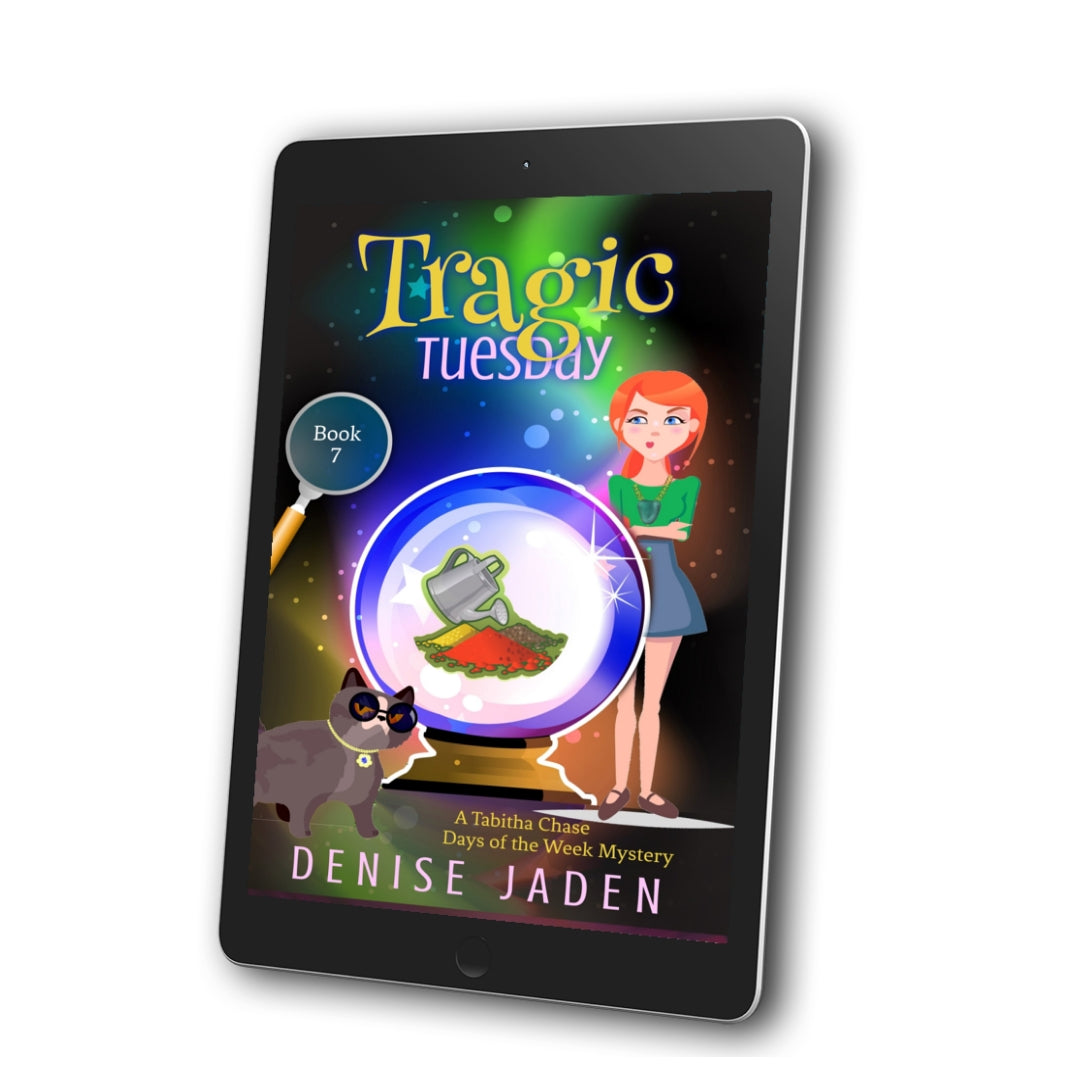
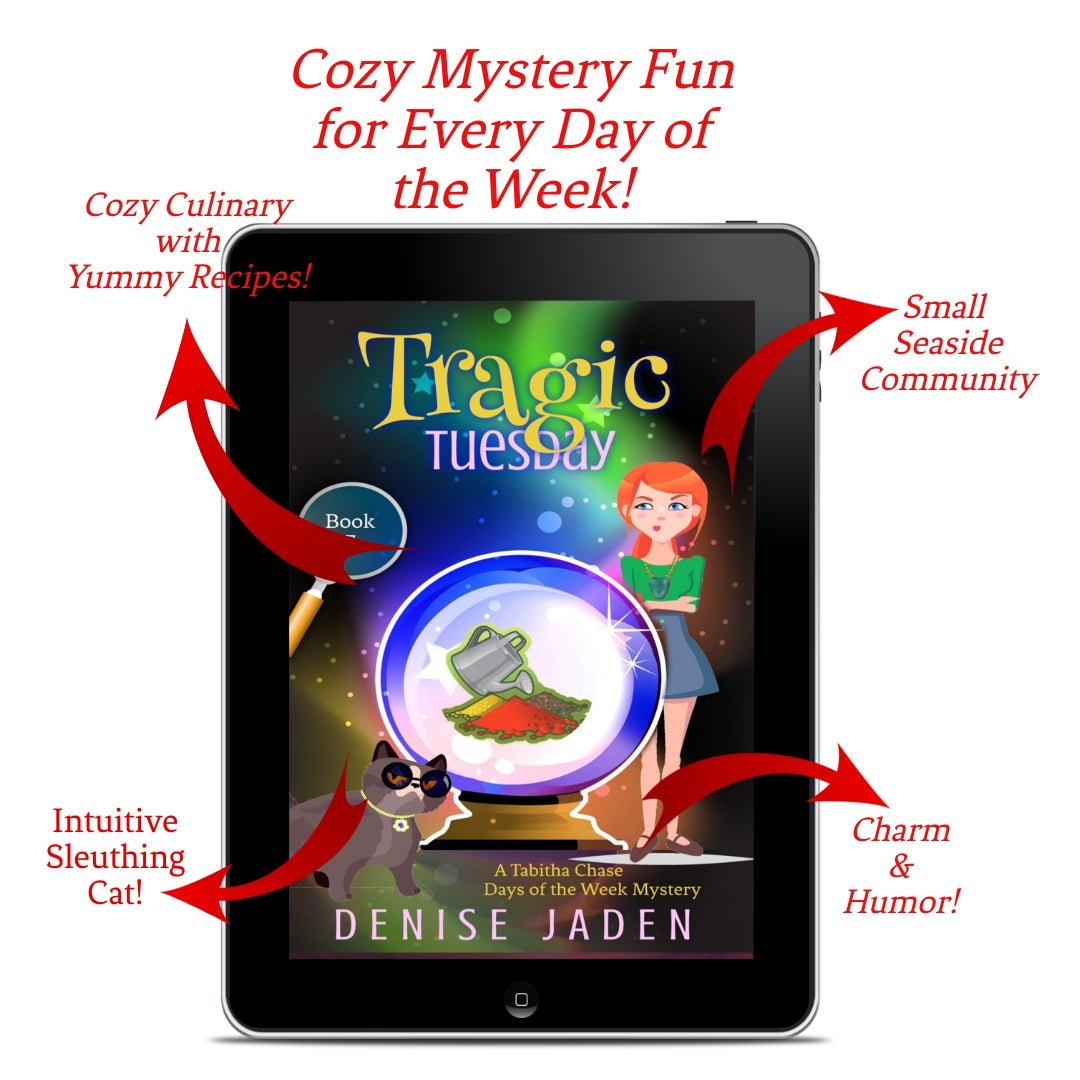
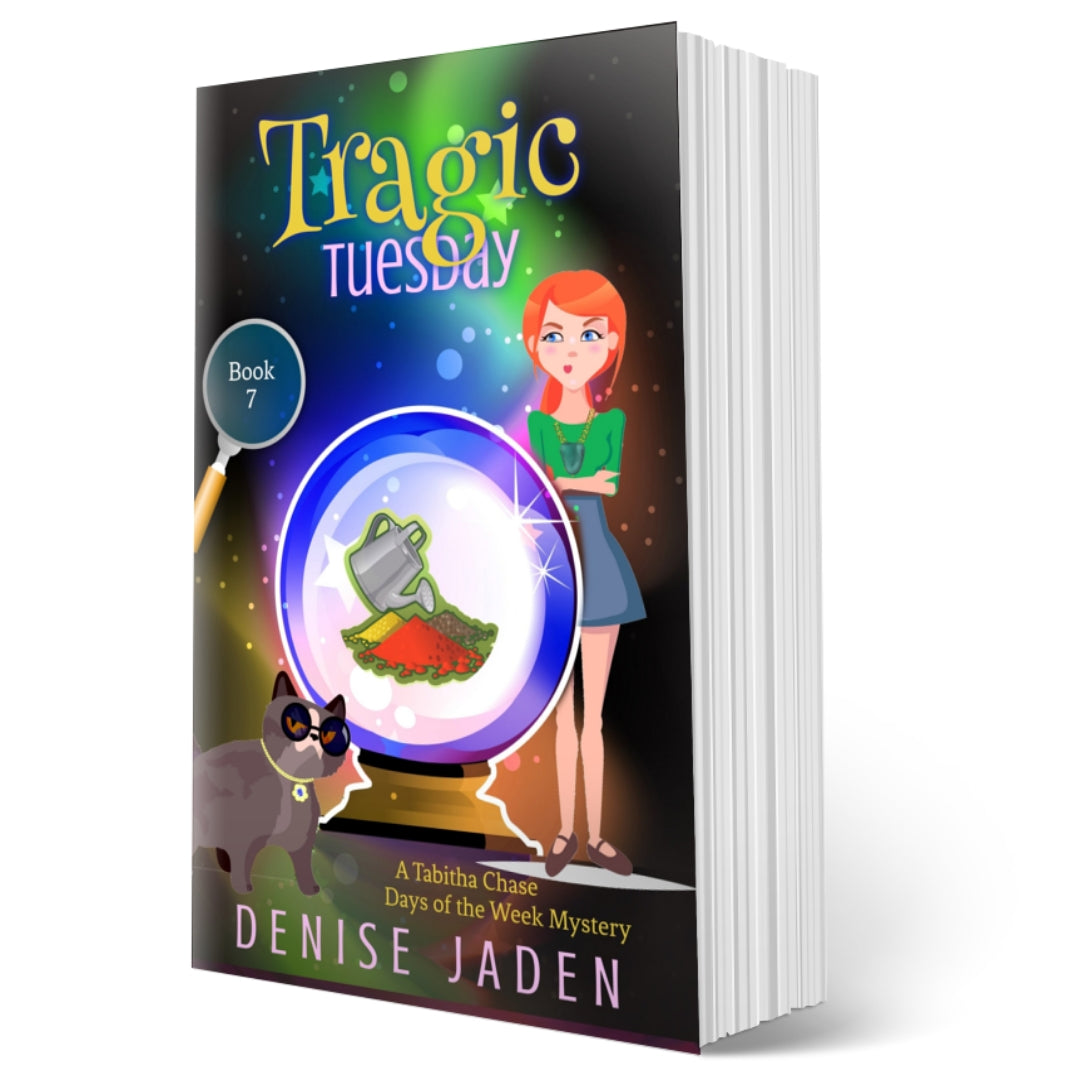
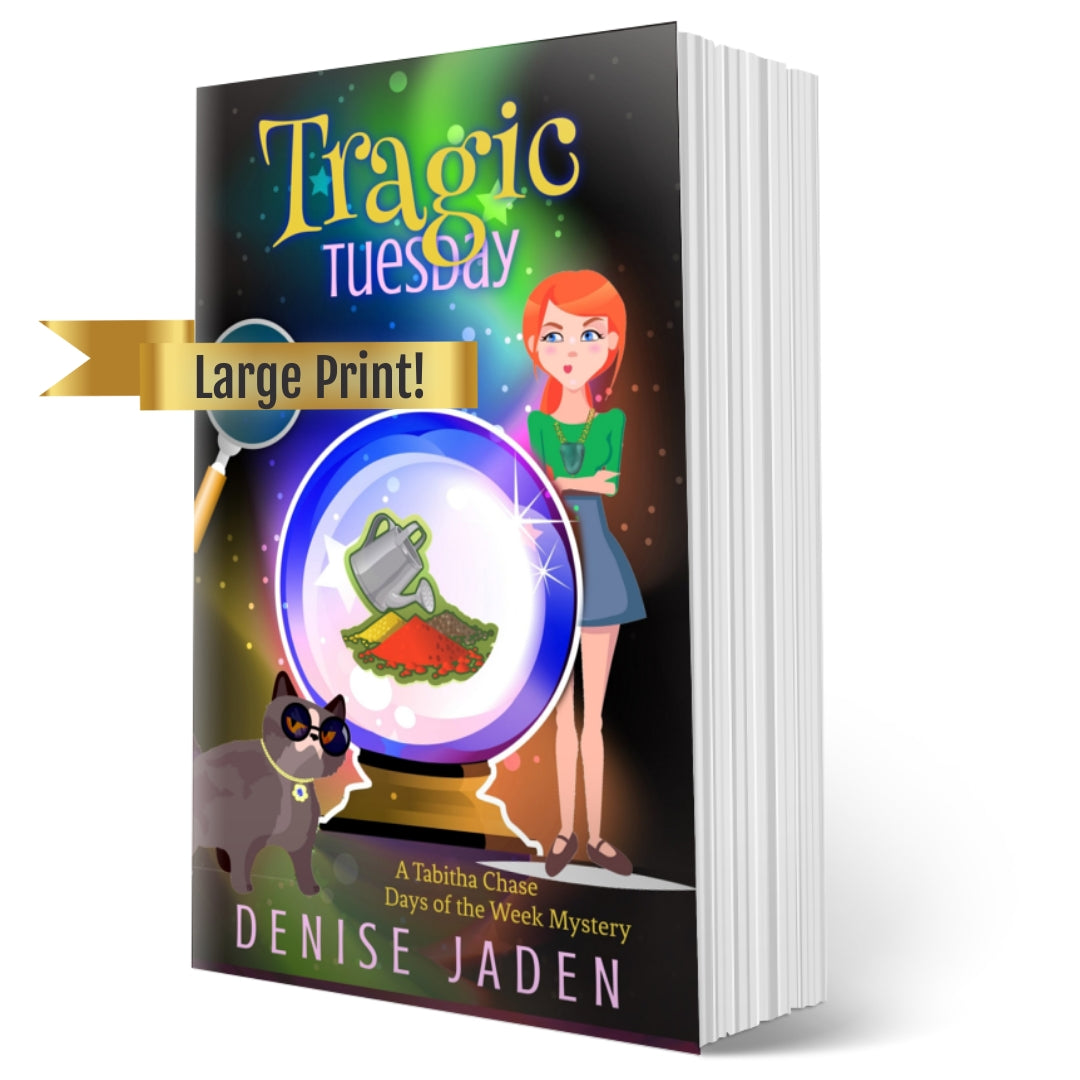
What Readers are Saying...
-
⭐⭐⭐⭐⭐ A Delightful Series!
"I enthusiastically recommend not only this book but this entire series for your reading enjoyment. There is excitement and suspense and you have a four footed feline cat named Sherlock who lives up to his named who sniffs out critical clues and is there to save the day when things look very bleak for our heroine Tabitha Chase!"
-
⭐⭐⭐⭐⭐ Great conclusion!
"Another fun mystery with some really wonderful characters in a great setting. It will keep you guessing.
Bonus epilogue - Big changes are ahead for Tabby. So exciting. Great conclusion." -
⭐⭐⭐⭐⭐ Can't wait for more!
"Good book, I enjoyed reading this book. The storyline is entertaining and I can't wait to read more from this author."

